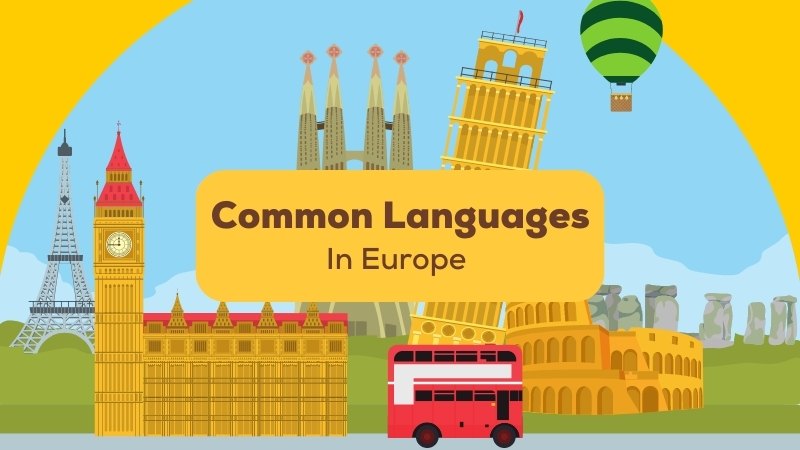We may not be out of the pandemic yet, but most countries have lifted restrictions. And we know what that means — it’s time to travel again! Next stop, Europe. In this post, we’ll talk about what common languages in Europe you should master or at least be familiar with before visiting “the old continent.”
Europe consists of 46 nations, and that’s a lifetime of fantastic travel options just waiting to be discovered. While only 24 official languages are recognized on the continent, there are over 200 languages spoken in Europe by nearly 750 million people are spoken in Europe. That’s more than any one individual can expect to learn and master in a lifetime.
Nevertheless, if you’re traveling to Europe soon, it’s to your best advantage to attempt to learn a language or two!
7 Best Languages To Learn When Traveling To Europe
Did you know that Europe is the world’s second smallest continent, with about 4 million square miles? Yet, despite that, the most frequently spoken languages in Europe are also among the most widely spoken languages in the world.
Europe is a fantastic and unusual destination to explore, with all these languages and civilizations surviving within a very narrow geographic range. However, when it comes to picking which language to study for your holiday, all of these options might be overwhelming. But don’t worry. We’ll break down the most widely-spoken languages in Europe to help you decide which one will be most useful for your next trip!
German
German, the language of philosophers and intellectuals, ranks second in terms of the European native-speaking population. It is Europe’s second most prevalent language, following only English. So how practical is it to learn German? Germans aren’t considered the world’s travel champions for no reason. They travel a lot, so there’s a huge chance you’ll get to practice saying, Wie gehts? and Guten Tag!
Russian
This may come as a surprise, but did you know that Russian is the most widely spoken language in Europe? That’s a total of 140 million native speakers in the country! Moreover, Russian is a widely spoken language in Central and Eastern Europe. This is especially fascinating because, although most European languages use the Latin alphabet, Russian employs the Cyrillic script. You’ll especially be able to put your Russian to the test if you visit the Czech Republic, especially Bulgaria, Moldavia, Romania, and Ukraine.
French
French, which has around 80 million native speakers, comes third on Europe’s list of most widely spoken languages. But more than that, French is spoken worldwide, with around 30 countries claiming it as their official language. That makes it one of the most practical languages you should learn before traveling to Europe. Convenu?
Italian
Italians may be the least spoken language in Europe, being mainly focused on Italy. However, that doesn’t necessarily mean you won’t find it useful. On the contrary, there are 67 million people in Europe who consider Italian as their native tongue. Yes, you’ll be able to survive in much of Europe without knowing a single Italian word. But if you’re planning to make a stop in Italy, be sure to learn a bit about le langage de l’amour.

Turkish
Turkish may be the official language of Turkey, but Turkey being a transcontinental country, people in Istanbul and Cappadocia aren’t the only ones who speak the language. Turkish speakers make up about 1.3 million of Germany’s population, which may surprise those who are not familiar with the continent. It’s also extensively spoken around the Mediterranean, most notably in Macedonia, Greece, and Serbia. Speaking of Serbia, learning Serbian is useful in South East Europe.
As for Turkish, there are about 78 million Turkish speakers in Europe, making the language Europe’s fourth most-spoken language.
Spanish
Spain has long had a coveted position as one of the top tourist destinations in Europe, especially for tourists seeking a sunny and restful summer holiday. However, that’s not the only reason you should start learning Spanish; 43 million people in Europe consider Spanish as their mother language. So while you’re most likely only ever to get to say ¿Cómo estás? and Mucho gusto in Spain, it won’t be unusual for you to meet Spanish speakers, especially if traveling to Central Europe.
English
Last but not least, we have English. We know that English is the universal language, the world’s lingua franca, and that many countries encourage their people to learn it as their second language. And while there’s quite a diversity of languages spoken in Europe, English tops most of them, being the 6th most spoken language in the country. So, if you don’t speak English yet, it’s ideal to start learning now and be counted among the 212 million people in Europe who speak the language.
Two Other Useful Languages To Learn
In addition to the top seven common languages in Europe on the list, there are two other languages you will find useful to learn before traveling to the country. These are Polish and Dutch.
Polish
Polish is not as popular as the other languages mentioned above. However, the fact that there are 36 million Europeans who speak Polish means learning the language makes a lot of sense. Consider learning Polish if you’re planning to visit Belarus, Czechia, Hungary, or Ukraine.
Dutch
Dutch comes after Polish as one of the most-spoken languages in Europe. As such, it’s often found at the bottom of the list of languages to learn when visiting the country. Despite that, it’s definitely a useful language to learn, considering that 22 million people in Europe speak Dutch. And compared to other Germanic languages, Dutch is one of the easiest languages for English speakers to learn and master.
Wrapping Up
Learning even just the basics of each of the languages on our list can prove to be essential when traveling to Europe. The top three — German, Russian, and French — are arguably the most beneficial in addition to English. However, we encourage you to learn the ones you believe you’ll enjoy using the most. After all, it’s not about mastering the one that the majority uses but loving the process of learning whichever language you desire to speak.

Author: Eric James Estante
Eric hails from the “City of Love” in the Philippines — Iloilo. He was born in Batangas City, but his family moved several times when he was growing up, giving him the opportunity to live on all three major islands of the Philippines and learn to speak Tagalog, Hiligaynon, Karay-a, and a little bit of Cebuano. He also has a background in Greek and Hebrew, having learned the languages while in the seminary. He has a passion for teaching and has been teaching English grammar to foreign students since 2008.



































































